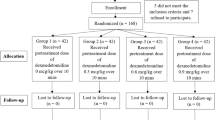Abstract
Purpose
We aimed to investigate the effects of pretreatment with a small dose of dexmedetomidine on the cough caused by sufentanil during anesthetic induction.
Methods
Two hundred and forty patients undergoing elective gynecological surgery under general anesthesia were randomly allocated to 4 groups (n = 60, each group). Dexmedetomidine 0, 0.1, 0.25, and 0.5 μg/kg was administered in 5 min to groups I, II, III, and IV, respectively, followed by the induction of general anesthesia with intravenous propofol, at a target concentration of 5 μg/ml, and sufentanil 0.5 μg/kg. The incidences and severity of cough that occurred within 1 min after the injection of sufentanil were recorded, and the incidences of cardiovascular adverse events that occurred between the administration of the dexmedetomidine infusion and 1 min after tracheal intubation were recorded.
Results
The incidences of cough in group II, group III, and group IV were lower than that in group I (6.7, 5.0, and 6.7 vs. 26.7 %, P < 0.01), while there were no significant differences between group II, group III, and group IV. The incidences of severe sinus bradycardia in group III and group IV were higher than that in group I (18.3 and 23.3 vs. 0.0 %, P < 0.01), while there was no significant difference between group I and group II. There was no significant difference in the incidence of low blood pressure among the four groups.
Conclusion
Dexmedetomidine at 0.10, 0.25, and 0.50 μg/kg significantly reduced the incidence of sufentanil-induced cough during anesthetic induction, with the effect being most marked for 0.10 μg/kg dexmedetomidine.
Similar content being viewed by others
References
Agarwal A, Aaim A, Ambesh S, Bose N, Dhiraj S, Sahu D, Singh U. Salbutamol, beclomethasone or sodium chromoglycate suppress coughing induced by iv fentanyl. Can J Anaesth. 2003;50(3):297–300.
Tweed WA, Dakin D. Explosive coughing after bolus fentanyl injection. Anesth Analg. 2001;92(6):1442–3.
Agarwal A, Gautam S, Nath SS, Gupta D, Singh U. Comparison of the incidence and severity of cough induced by sufentanil and fentanyl: a prospective, randomised, double-blind study. Anaesthesia. 2007;62(12):1230–2.
Lin CS, Sun WZ, Chan WH, Lin CJ, Yeh HM, Mok MS. Intravenous lidocaine and ephedrine, but not propofol, suppress fentanyl-induced cough. Can J Anaesth. 2004;51(7):654–9.
Lui PW, Hsing CH, Chu YC. Terbutaline inhalation suppresses fentanyl-induced coughing. Can J Anaesth. 1996;43(12):1216–9.
Pandey CK, Raza M, Ranjan R, Lakra A, Agarwal A, Singh U, Singh RB, Singh PK. Intravenous lidocaine suppresses fentanyl-induced coughing: a double-blind, prospective, randomized placebo-controlled study. Anesth Analg. 2004;99(6):1696–8.
Horng HC, Wong CS, Hsiao KN, Huh BK, Kuo CP, Cherng CH, Wu CT. Pre-medication with intravenous clonidine suppresses fentanyl-induced cough. Acta Anaesthesiol Scand. 2007;51(7):862–5.
Yeh CC, Wu CT, Huh BK, Lee MS, Lin SL, Sheen MJ, Wong CS. Premedication with intravenous low-dose ketamine suppresses fentanyl-induced cough. J Clin Anesth. 2007;19(1):53–6.
Lin JA, Chen FC, Lee MS, Horng HC, Cherng CH, Yeh CC, Wong CS. Intravenous dexamethasone pretreatment reduces fentanyl-induced cough. J Formos Med Assoc. 2007;106(8):649–55.
Hung KC, Chen CW, Lin VC, Weng HC, Hsieh SW. The effect of pre-emptive use of minimal dose fentanyl on fentanyl-induced coughing. Anaesthesia. 2010;65(1):4–7.
Hall JE, Uhrich TD, Barney JA, Arain SR, Ebert TJ. Sedative, amnestic and analgesic properties of small-dose dexmedetomidine infusions. Anesth Analg. 2000;90(3):699–705.
Gharagozlou P, Demirci H, Clark JD, Lameh J. Activation profiles of opioid ligands in HEK cells expressing delta opioid receptors receptors. BMC Neurosci. 2002;3:19.
Yemen TA. Small doses of sufentanil will produce violent coughing in young children. Anesthesiology. 1998;89(1):271–2.
Bohrer H, Fleischer F, Werning P. Tussive effect of a fentanyl bolus administered through a central venous catheter. Anaesthesia. 1990;45:18–21.
Tanaka M, Maruyama K. Cough reflex induced by micro-injection of citric acid into the larynx of guinea pigs: new coughing model. J Pharmacol Sci. 2003;93:465–70.
Tanaka M, Maruyama K. Mechanisms of capsaicin and citric acid induced cough reflexes in guinea pigs. J Pharmacol Sci. 2005;99:77–82.
Wang L, Yao JH, Zhu JJ, Liu B, Zhu JG, Zhou DC. Effect of optimizing anesthetic injecting sequence during induction on fentanyl-induced coughing. Chin Med J. 2010;90(13):921–3.
Bhana N, Goa KL, McClellan K. Dexmedetomidine. Drugs. 2000;59(2):263–8.
Weinger MB, Chen DY, Lin T, Lau C, Koob GF, Smith NT. A role for CNS alpha-2 adrenergic receptors in opiate-induced muscle rigidity in the rat. Brain Res. 1995;669(1):10–8.
Hung KC. The possible mechanism of clonidine to suppress fentanyl-induced coughing. Acta Anaesthesiol Scand. 2009;53(9):1227–8.
Groeben H, Mitzner W, Brown RH. Effect of the alpha2-adrenoceptor agonist dexmedetomidine on bronchoconstriction in dogs. Anesthesiology. 2004;100(2):359–63.
Sato T, Hirota K, Matsuki A, Zsigmond EK, Rabito SF. The role of the N-methyl-d-aspartic acid receptor in the relaxant effect of ketamine on tracheal smooth muscle. Anesth Analg. 1998;87(6):1383–8.
Turan G, Ozgultekin A, Turan C, Dincer E, Yuksel G. Advantageous effects of dexmedetomidine on haemodynamic and recovery responses during extubation for intracranial surgery. Eur J Anaesthesiol. 2008;25(10):816–20.
Guler G, Akin A, Tosun Z, Eskitascoqlu E, Mizrak A, Boyaci A. Single-dose dexmedetomidine attenuates airway and circulatory reflexes during extubation. Acta Anaesthesiol Scand. 2005;49(8):1088–91.
Oshima T, Kasuya Y, Okumura Y, Murakami T, Dohi S. Identification of independent risk factors for fentanyl-induced cough. Can J Anaesth. 2006;53(8):753.
Conflict of interest
No external funding and no competing interests are declared.
Author information
Authors and Affiliations
Corresponding author
About this article
Cite this article
Sun, S., Huang, Sq. Effects of pretreatment with a small dose of dexmedetomidine on sufentanil-induced cough during anesthetic induction. J Anesth 27, 25–28 (2013). https://doi.org/10.1007/s00540-012-1470-y
Received:
Accepted:
Published:
Issue Date:
DOI: https://doi.org/10.1007/s00540-012-1470-y




